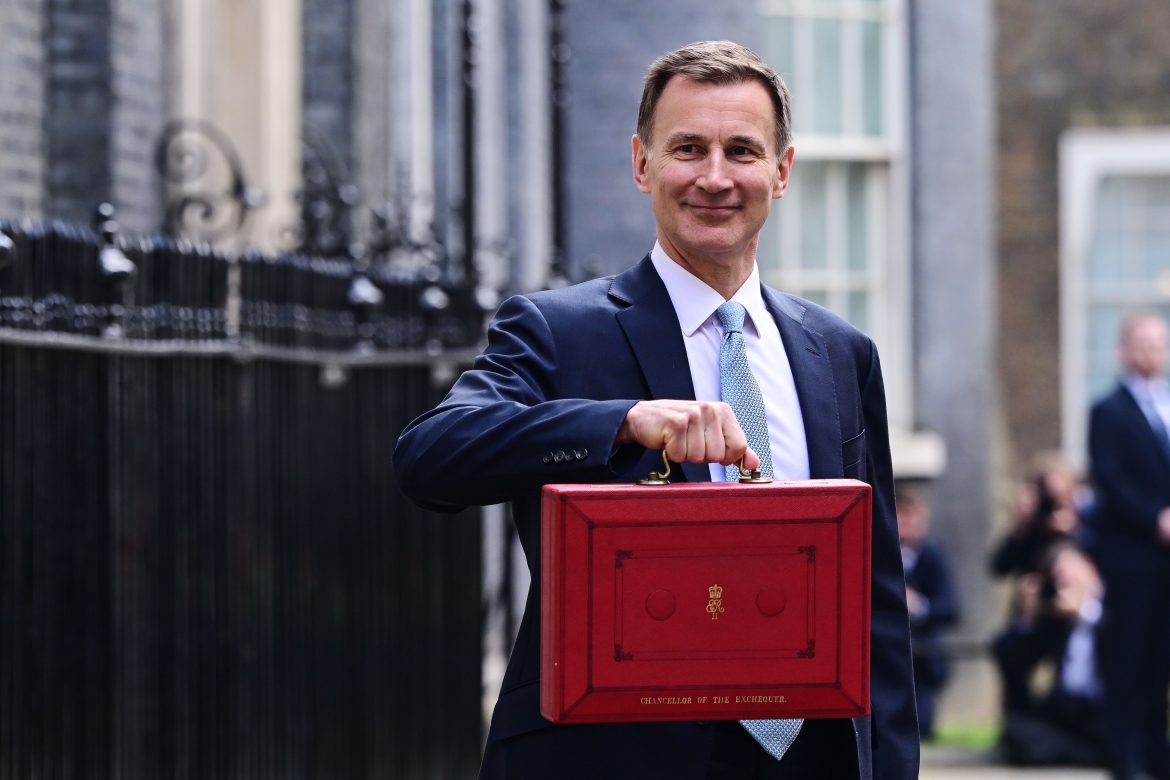A 2p cut to National Insurance, revised GDP forecasts and a continued freeze on alcohol duty dominated headlines from this year’s Spring budget. To help you understand what impact these measures, and more, announced this week will have, we’ve broken down the key statistics from Chancellor Jeremy Hunt’s latest proposals.
This budget arrives against a particularly challenging economic landscape – with inflation rates that have remained stubbornly above the Government’s 2% target post-pandemic and historic strains on public services.
The budget also takes place against a deeply unfavourable political environment for the incumbent Conservative government – who are trailing the opposition Labour Party by nearly 30% in some polls.
Among the new announcements the government hopes will turn things around is a 2p reduction in national insurance rates – the second such reduction this year.
For those earning £25K annually, the national insurance change will result in yearly savings of £249 – rising to £449 for £35K earners and £749 for £50K earners.
On Thursday (March 7), the government signaled its desire to scrap national insurance entirely – although plans to do so seemingly remain distant, with it remaining unclear how such a drastic measure would be funded.
Describing the current Child Benefit system as “confusing and unfair”, Hunt announced changes to how eligibility will be assessed.
Whereas Child Benefit has previously been reduced when one parent begins earning over £50,000 a year, the Chancellor has promised to move to “household-based system” that considers combined parental income by April 2026.
However, a more immediate change will arise this April when the High-Income Child Benefit Charge threshold will be raised from £50,000 to £60,000.
Another headline figure from Hunt’s speech to Parliament was the proposal to introduce an excise duty on vaping products from October 2026, with the aim “to discourage non-smokers from taking up vaping”.
Vaping and other e-cigarette products have been marketed as a healthier alternative to smoking, although an ongoing rise in usage of the products has sparked fears of respiratory damage and addiction problems.
Although there is a correlation between falling levels of traditional cigarette smoking and rising usage of e-cigarettes (as the below figure shows), how strong the connection between the two is remains disputed.
Indeed, vaping is currently most popular among 16 – 24 year olds, many of whom have inevitably had their first taste of nicotine via e-cigarettes.

Other key changes announced in the budget included a pledge to have nuclear energy provide “up to a quarter” of electricity by 2050 and the abolition of the controversial “non-dom” status that allows some to take residence in the UK while being exempt from taxes on foreign earnings.

Despite the vast majority of the British public showing disapproval for the Sunak-Hunt government’s performance thus far, the chancellor attempted to paint a picture of a promising, resilient economy.

On education, Hunt celebrated. He said: “In 2010, schools in the UK were behind Germany, France and Sweden in the OECD’s PISA education rankings for reading and maths. Now, we are ahead of them.”
However, while PISA scores in mathematics have risen sharply in the last decade, continuous falls in reading and science attainment have been measured since 2012.

Multiple education experts also cast doubt on the usefulness of PISA testing, with UCL professor John Jerrim having previously expressed concerns that “lower-achieving pupils have been systematically excluded” by the examination system.
Indeed, outside of PISA scoring, the education statistics are bleak with almost 9% of the education workforce in England having left the profession in 2021-22 alone, while 95% of teachers have said that growing class sizes are damaging their ability to meet pupils’ needs.
On the NHS, Hunt promised an additional £6bn in funds and admitted that “the NHS is still recovering from the pandemic”, while celebrating that there have been “250 more doctors and 400 more nurses for every month we’ve been in office.”
Indeed, data from the Nuffield Trust demonstrates that there has been a significant overall increase in the number of NHS staff since 2010, although this has not been seen uniformly across the board.
Between 2010 and 2023, the NHS recorded a 44% decline in the number of learning disability nurses and a 29% drop in the number of health visitors.
Meanwhile, the percentage of people waiting over four hours in A&E in England ballooned from 8.10% in January 2013 to 42.4% in September 2023 – suggesting that increases in NHS staff alone have not been sufficient to address the strains facing the British health service.

Listing accomplishments, Hunt said: “Since 2010 growth has been higher than every large European economy, unemployment has halved, absolute poverty has gone down and there are 800 more people in jobs for every single day that we’ve been in office.”
The UK economy is currently in recession after two consecutive quarterly falls in GDP of -0.1% and -0.3%, respectively in the last six months of 2023. This was omitted entirely from Hunt’s speech on Wednesday.
However, since 2010, growth levels in the UK have remained in line with that of other G7 economies – averaging 1.61% yearly GDP growth between 2010 and 2022.

This represents a slight out-performance compared to Germany (1.56%) and a more significant out-performance of Italy (0.34%) and France (1.21%).
However, the UK’s average still ranks below that of non-European G7 counterparts Canada and the United States, who saw average annual GDP growth of 1.99% and 2.14%, respectively, in this period.
Meanwhile, the most recent data from the Office for National Statistics puts the British unemployment rate at 3.8% – a record low not recorded in nearly 50 years.
On inflation, Hunt lauded the latest figures that show 4% inflation – “more than meeting [the government’s] pledge to halve it last year” – and said that inflation is set to fall below the 2% target within months.
Regarding poverty, the overall picture is perhaps more complicated than the Chancellor’s comments suggest. While he is correct to say that absolute poverty has fallen since the Conservative government came into power in 2010, another spike is expected.

Last autumn, the Resolution Foundation forecast a rise in absolute poverty from 11.4 million in 2020/21 to 12 million in 2024-25.
While this would still be lower than the number of people suffering from absolute poverty in 2010, other indicators not mentioned in the budget demonstrate alarming struggles related to the cost of living.
Chief among these is the number of people claiming emergency food parcels from the Trussell Trust – which has expanded from 61,468 in 2010/11 to nearly three million in 2022/23.

While such figures paint a bleak portrait of the economic standing of Britons across the country, Hunt and Sunak will undoubtedly be hoping that there was enough good news in this week’s budget to improve their public standing.
With a general election widely expected later this year, and polls showing the conservatives averaging 24% against Labour’s 44%, this government will have to achieve an unprecedented bounce back if they want Hunt to be delivering next year’s Spring budget as well.





